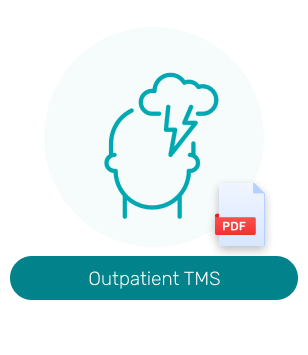
Transcranial Magnetic Stimulation
(TMS Therapy)
TMS is a procedure that involves the focused application of a magnetic field to superficial regions of the brain, changing the activity level of cells in the stimulated areas. During a TMS procedure, an electrical current passes through a small coil placed against the scalp, this current induces a magnetic field. The magnetic field is applied in pulses that can pass into the brain without resistance. If the magnetic field is of sufficient strength it will stimulate electrical activity in neurons below the coil, causing them to fire. TMS can be applied in differing ways.
TMS is available for patients with depression and who have a history of poor response to, or an inability to tolerate the side effects of antidepressant medications. It is also available to those patients who have had a previous good response to TMS.
Some people feel tired after each TMS treatment though this differs from person to person.
Some people report an improvement in their night sleep pattern.
NO, patients are now able to access TMS treatment through Self-Funding as an outpatient.
- A list of current medications and all your physical medications
- Any current pathology results
- Comfortable clothing
- GP referral - include physical examination
- Medicare card
- Please leave all valuables at home.
During the session you are seated in a comfortable chair. You are fully conscious and responsive.
There are no medications involved in the treatment.
The TMS nurse rests the magnet over the appropriate area of the scalp and activates the magnet.
During your prescribed treatment you may talk with the nurse, rest or meditate as you see fit.
Those people who are going to respond to TMS usually show some initial improvement in their mood after four to six sessions.
It may take up to 20 sessions for your mood to return to its usual level.
There is no evidence stating that TMS does any damage to your hair or scalp.
TMS is not known to lead to memory difficulties.
You may notice an improvement in your memory as your mood improves.
As TMS involves magnetic energy, some people may be unable to have TMS including those with:
- A cardiac pacemaker or defibrillator
- A neurostimulator or biostimulator
- Brain aneurysm clips
- Cochlear implants
- History of previous head or brain surgery
- History of seizures, fits, epilepsy or stroke
- Or a significant neurological disorder (e.g. MS, cerebral lupus, brain tumour, etc.)
- TMS is not recommended for people during pregnancy.
People with dental fillings / braces are able to receive TMS.
You will be asked to complete and sign a safety checklist prior to receiving TMS.
Patients wishing to have TMS as an outpatient can self-fund their treatment. Patients can also access Outpatient TMS via DVA, Workcover and TAC.
- Packages are available from Northpark Private Hospital for Outpatient TMS for patients who have already had TMS before or utilized MBS funding. Estimates can be provided from our billing departments, and an official quote provided after consultation with a credentialed psychiatrist and prescription of treatment outlined.


